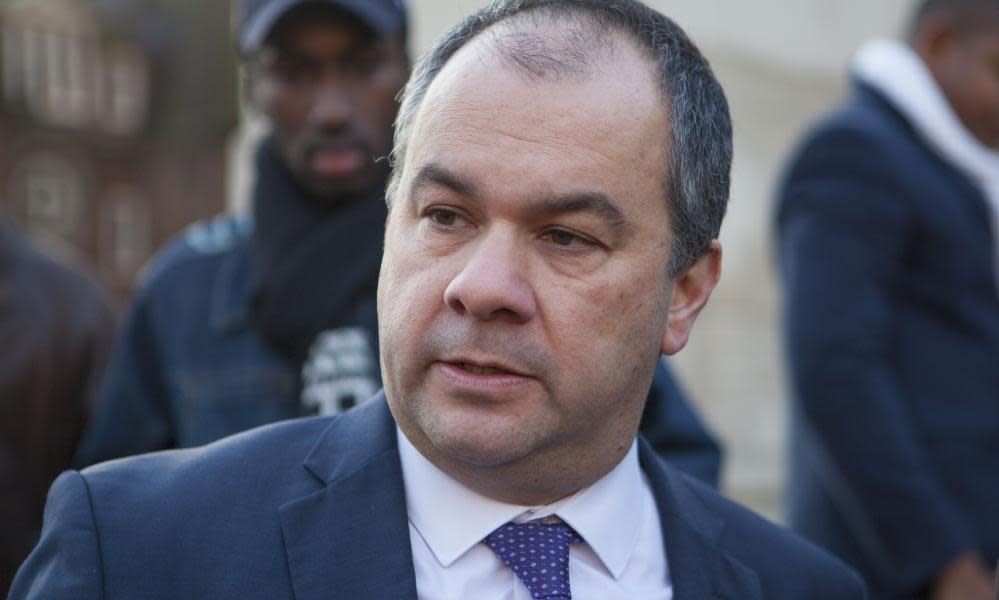Hapless Scully takes flak for Sunak, he who must be protected at all costs

Rishi Sunak is a busy man. Not so busy, mind, that he couldn’t find time to text David Cameron to apologise for being so slow to reply and that he would get back to him as soon as possible.
Nor so busy that he couldn’t later text the former prime minister to say he was really pushing his team to find a way to extend access to funds for the bank on whose behalf Dave was now lobbying. But far, far too busy to come to the House of Commons to answer an urgent question from the shadow chancellor, Anneliese Dodds, about the apparent backdoor croneyism between the Treasury and Greensill bank.
So it was left to the hapless Paul Scully, a junior minister at the Department for Business, Energy and Industrial Strategy (Beis), to take the flak for the chancellor. Scully had tried to duck out, pointing out that the question had been put to the Treasury rather than Beis, but his protests had been swatted away. Labour had been dim enough to make its question sufficiently vague for the government to get away with palming it off on another department, but serious enough so that only a complete no-mark could be allowed to answer it. Rishi must be protected at all costs.
Related: MPs line up to parrot platitudes in tribute to Prince Philip | John Crace
The shadow chancellor tried to hide her disappointment at being confronted by Scully rather Sunak and ploughed ahead with her questions. In what ways had the chancellor pushed his team to give his old mucker a helping hand? And what conversations had taken place at the 10 meetings between Treasury officials and Greensill? What were the alternative funding schemes they had been exploring?
Scully merely shrugged. He was sorry that Dodds was feeling neglected by the chancellor but if she wanted to get him to come to the chamber then she needed to call him on his personal mobile. That was the only way anyone could get Rishi to do anything these days. And if she didn’t have his number then he knew someone who did. Though Dave might not be quite as quick to pick up calls from numbers he didn’t recognise as he had been before the lobbying allegations were picked up by the media.
It was like this, said Scully, already playing for time. Cameron had been such a spectacular failure as a lobbyist that most ministers didn’t even know they had been lobbied. He hadn’t even, like everyone else, tried to cash in by flogging the government PPE that didn’t work. Nor had he even managed to get Greensill access to all the cash it had wanted.
All he had achieved was to obtain government backing for a lesser scheme so that the bank could lend money it didn’t know it didn’t have. Or something like that. Why, Dave was the only lobbyist he knew who could put out a 1,700-word statement intended to clear his name that only managed to make him sound more guilty. And in any case, concluded Scully, the government had now set up an inquiry and so it would be wrong for him to say anything that might pre-empt its findings.
A few Tories had made the effort to rally to Scully’s side. Felicity Buchan didn’t care what Dave had done, she just wanted reassurance that Rishi had followed the codes of conduct. Jacob Young and Bob Blackman observed that it had been only right for the government to pursue every possible line of funding – especially those put forward by Tory friends – as the coronavirus situation had been critical so it would have been foolish not to take Cameron’s proposals seriously. Even if they had later turned out to be dodgy.
It wasn’t long before the last Conservative backbencher had left the building, leaving Scully to face an angry and sceptical opposition alone. A punishment beating that he took stoically if not willingly. If the chancellor did have a fault, he said, it was that he had both tried to do everything he could to save the country’s finances and been too trusting in those from whom he had accepted advice. He had been too willing to look for the good in people. That’s why he had instructed officials to have 10 meetings with Greensill. Because he couldn’t believe how hopeless Dave had been at the first nine meetings.
“I don’t accept the description of Cameron as ‘Dodgy Dave’,” Scully insisted. Though it rather sounded as if he did. Along with Useless Dave and Needy Dave. A former prime minister desperate to prove to himself and others that he still had some agency in the world. And a government that no longer believed it needed to obey the rules. Besides, if it came down to a straight fight between “save Rishi” and “save Dave”, then it would be no contest. Boris Johnson would take great pleasure from throwing Cameron under a bus.
Scully checked the messages on his phone. Nada. Not that he had really expected any. But still, even though invisibility was his defining feature, it would be nice to be thanked for doing the dirty jobs from time to time.

 Yahoo News
Yahoo News 
